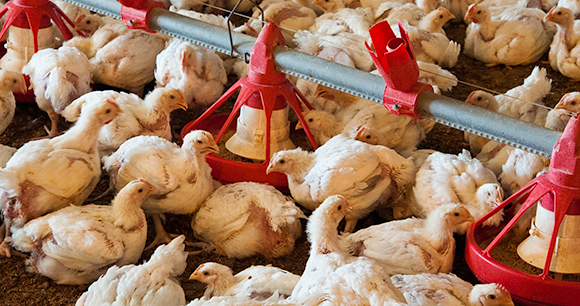
Washington, DC—Eighty-eight percent of American consumers believe that claims such as “humanely raised” or “sustainably farmed” on meat and poultry products should be based on meaningful, measurable standards, according to a newly released survey.
The online survey of more than 2,000 US adults was conducted this month by The Harris Poll on behalf of the Animal Welfare Institute (AWI). Since 2010, AWI has commissioned five polls evaluating consumer attitudes about the claims used on meat and poultry packaging; in every survey, at least 80% of respondents agreed that food producers should not be allowed to use the claim “humanely raised” on their meat or poultry product labels unless the producers exceed minimum industry animal care standards.
Surveys conducted by other organizations similarly have found that American consumers are increasingly aware of, and concerned about, how animals raised for food are treated.
“Consumers overwhelmingly agree that the meat and poultry industry should no longer be allowed to set its own definition of ‘humanely raised’ and charge a premium for products that have not been independently verified as higher welfare,” said Zack Strong, director of AWI’s Farmed Animal Program. “Our survey results consistently show that the public demands stronger government regulation of animal-raising claims.”
For more than a decade, AWI has been the leading national nonprofit organization that routinely monitors the use of animal welfare claims such as “humanely raised” on meat and poultry packages, documenting in multiple reports how the US Department of Agriculture is failing consumers by continuing to allow deceptive marketing practices.
AWI’s most recent analysis, “Deceptive Consumer Labels,” found that 85% of the label claims reviewed by the USDA from 2019 to 2021 lacked meaningful substantiation, with inadequate or no evidence provided to support use of the claim. Other highlights of the May survey:
- More than 4 in 5 Americans (84%) agree that the government should not allow the use of claims like “humanely raised” on food labels unless producers are independently inspected and verified. A similar proportion (81%) believe that holistic animal-raising claims such as “humanely raised” should not be defined by a single factor (e.g., “vegetarian fed”), as currently permitted by the USDA.
- Seven in ten Americans (70%) agree that claims such as “humanely raised” or “sustainably farmed” found on meat and poultry product packages help them decide what products to purchase.
To help consumers locate products from farms where animals are raised to higher-welfare standards, AWI provides a comprehensive guide to animal-raising claims commonly found on meat, egg, and dairy products. There is also an abundance of cruelty-free, plant-based options available to people and their companion animals.
Survey Method:
This survey was conducted online within the United States by The Harris Poll on behalf of AWI from May 8-12, 2025, among 2,087 adults ages 18+. The sampling precision of Harris online polls is measured by using a Bayesian credible interval. For this study, the sample data is accurate to within +/- 2.5 percentage points using a 95% confidence level.
Marjorie Fishman, Animal Welfare Institute
[email protected], (202) 446-2128
The Animal Welfare Institute (awionline.org) is a nonprofit charitable organization founded in 1951 and dedicated to alleviating animal suffering caused by people. We seek to improve the welfare of animals everywhere: in agriculture, in commerce, in our homes and communities, in research, and in the wild. Follow us on Facebook, Instagram, Threads, Bluesky, and LinkedIn for updates and other important animal protection news.